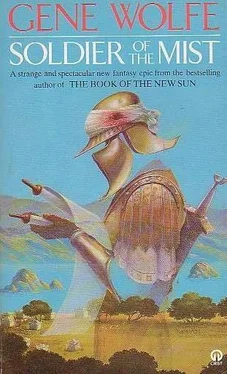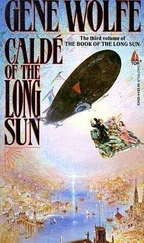Gene Wolfe - Soldier of the mist
Здесь есть возможность читать онлайн «Gene Wolfe - Soldier of the mist» весь текст электронной книги совершенно бесплатно (целиком полную версию без сокращений). В некоторых случаях можно слушать аудио, скачать через торрент в формате fb2 и присутствует краткое содержание. Жанр: Фэнтези, на английском языке. Описание произведения, (предисловие) а так же отзывы посетителей доступны на портале библиотеки ЛибКат.
- Название:Soldier of the mist
- Автор:
- Жанр:
- Год:неизвестен
- ISBN:нет данных
- Рейтинг книги:3 / 5. Голосов: 1
-
Избранное:Добавить в избранное
- Отзывы:
-
Ваша оценка:
- 60
- 1
- 2
- 3
- 4
- 5
Soldier of the mist: краткое содержание, описание и аннотация
Предлагаем к чтению аннотацию, описание, краткое содержание или предисловие (зависит от того, что написал сам автор книги «Soldier of the mist»). Если вы не нашли необходимую информацию о книге — напишите в комментариях, мы постараемся отыскать её.
Soldier of the mist — читать онлайн бесплатно полную книгу (весь текст) целиком
Ниже представлен текст книги, разбитый по страницам. Система сохранения места последней прочитанной страницы, позволяет с удобством читать онлайн бесплатно книгу «Soldier of the mist», без необходимости каждый раз заново искать на чём Вы остановились. Поставьте закладку, и сможете в любой момент перейти на страницу, на которой закончили чтение.
Интервал:
Закладка:
"I must speak to him about that," I told her.
With what remained of my loaf in my hand, I went to the fire at which he sat and seated myself beside him, saying, "Greetings, most noble Pasicrates."
"Ah," he said. "The victor. Yet a slave. Still a slave. I should not have demeaned myself, and the gods have punished me for it."
"As you say. You are our commander, the master of our ship and all on board. But if I'm a slave, I no longer recall whose. Your servant-I will not say your slave-has come to beg you to release the woman called Drakaina. She's done me no harm today. Has she harmed you?"
"No," he said. "We'll free her in the morning."
"Then let me swim to the ship, and I'll tell the watch you've ordered her freed."
He looked at me quizzically. "You'd swim there yourself, if I permitted it?"
"Certainly."
"Then you won't have to." He turned to one of his companions. "Take the boat and a couple of seamen, and tell them to free the woman. Bring her back with you."
The man nodded, rose, and vanished into the night.
"As for you, Latro, I want you to come with me. Do you know what this place is?"
I said, "They call it the Hot Gates, but I don't know why. Since we sacrificed to Leonidas, I suppose he's a hero and that he's buried here."
"He was," Pasicrates told me. "Our people dug up his body-what they could find of it-and sent it back to Rope. It had been hacked to bits." He spat. "The Great King paraded Leonidas's head on a spear."
As we walked on, I asked him what it was I smelled. It was like the stench of a bad egg, but so strong it overpowered even the tang of the sea.
"The springs. They boil out of the ground, not pure and cold like other springs, but steaming and reeking, sickening to drink and yet a cure for many ills. Or so I've been told. This is my first visit to this place, but they say in Rope that's why it's called the Hot Gates-it's the way to those boiling springs."
"Is that where we're going?" I asked him.
"No, only to the ruined wall. My men and I went to look at it by daylight, before you came out of the sea. Now I want to show it to you, and tell you what happened here. You'll forget, but I've begun to think that's because you're the ear of the gods; they hear, instead of you, or they take the memory of what you've heard from you. This is something the gods should know."
"There it is." I pointed. "Where that man sits combing his hair." I could see him plainly in the moonlight, naked and muscular, plowing his long dark locks with a comb of pale shell.
"You see a man dressing his hair?"
"Yes," I said. "And another-now he throws a discus. But this can't be the wall you're looking for. It isn't ruined."
Pasicrates told me, "Those must be ghosts you see. Here Leonidas and his Rope Makers exercised their bodies before the battle and readied them for burial. You and I are alone, and the wall lies in ruins before us. The Great King destroyed it so his host could pass."
I said, "Then Leonidas was killed, and the army of your city destroyed."
"He had no army, only three hundred Rope Makers, a few thousand slaves-he was the first to arm them-and a thousand or so unreliable allies. But the judges had instructed him to hold this road around Kallidromos, and he held it for three days against the Great King's host, until he and every man who'd stayed with him were dead. The Great King counted three millions all told, about half of them real fighting men and the rest mule drivers and the like."
"Surely that's impossible," I said. "Such a small force could never defend this place against so many."
"So the Great King thought." Pasicrates turned suddenly to face me. "That was a tear, I think, that struck my hand. You're no Rope Maker, Latro. Why do you weep?"
"Because I must have seen this battle," I said. "I must have taken part in it. And I have forgotten it."
There was a narrow gate in the wall, and as I spoke it opened and a gray-bearded man in armor came out. As he drew nearer, I saw he had only one eye. I described him to Pasicrates and asked whether it was Leonidas.
"No. It must be Leonidas's mantis, Megistias, who spoke the tongues of all the beasts." Pasicrates's voice was calm, but it was the calm of one who uses all his will to hold his fear in check.
In a moment Megistias stood before us. His face was pale and set, his single eye fierce in the moonlight, the eye of an old falcon half-blind. He muttered something I did not understand and passed his hand before my face.
Then he was gone. I stood in the front rank with other men, men armed as I was with two javelins, a helmet, back and breast plates, and a rectangular shield.
Turning to face the hundred, I shouted, "While the Immortals are gone, we could have no higher honor than to be the protectors of the Universal King, the King of the World's Four Quarters, the King of the Lands, the King of Parsa, the King of Media, the King of Sumer, the King of Akkad, the King of Babylon, and the King of Riverland. Let us treasure that honor and be worthy of it." Yet I paid little heed to the sense of what I myself had said; it had been in my own tongue, and knowing that my comrades understood it made its cadences more lovely to me than any music.
When I turned again, I saw why I had spoken. A knot of men was breaking from the melee, cleaving a path through the levies driven forward by their officers' whips; but there was small cause for fear: they were no more than thirty at most.
At my command, we cast the first javelin together, then the second. Our javelins were not like the light arrows of the archers; they had weight as well as speed, and they transfixed the hoplons of our enemies and pierced their corselets. Half a dozen fell at the first cast, more at the second, when every man drew his sword.
Another command; we locked shields and charged, the slope of the ground being with us. "Cassius!"
The man who opposed me was taller than I, his helmet high-crested and his battered armor traced with gold. He thrust for my eyes; but his own blazed not at me but at the Great King, who sat his throne on the hill behind us. I was only an obstacle that barred his way for a moment, then would bar it no more. I wanted to shout that I was no less a man than himself, my honor and my life as precious to me as his to him. But neither of us had time or breath for shouting.
I swung my falcata with all my strength, and the downward cut bit deep in the rim of his hoplon. Its bronze gripped the blade and held it, conquered in its conquest; a twist of his arm wrenched the falcata from my hand.
Disarmed, I barred his way still, blocking each thrust with my shield, giving way one bitter step at a time. The man on his right died, and the man on his left. I fell, tripped by what I cannot say. He rushed by me, but I slipped my shield arm from the leather loop and still half-recumbent hurled my shield at his back.
Except that it was not my shield, only the cloak in which I slept. I sat up and rubbed my eyes, my ears still ringing with the din of battle. The bodies of the slain drank their own blood, becoming only sleepers, living men who breathed and sometimes stirred. Leonidas was but the dying fire. I rose and saw the army of the Great King, proud horseman and cringing conscript, melt into the slopes of Kallidromos.
I could not sleep again, nor did I wish to. I built up the fire and spoke for a while with Drakaina, who was also awake. She says Falcata is the name I give my sword and not its kind, and that it is a kopis.
Then, recalling the map drawn by the captain of our ship and the way I had wrestled on the deck with Pasicrates, I wrote of those things here, and of Thoe the Nereid, my dream, and all the rest. Now Io has risen too, and she has read the writing on the columns to me. There are three.
Читать дальшеИнтервал:
Закладка:
Похожие книги на «Soldier of the mist»
Представляем Вашему вниманию похожие книги на «Soldier of the mist» списком для выбора. Мы отобрали схожую по названию и смыслу литературу в надежде предоставить читателям больше вариантов отыскать новые, интересные, ещё непрочитанные произведения.
Обсуждение, отзывы о книге «Soldier of the mist» и просто собственные мнения читателей. Оставьте ваши комментарии, напишите, что Вы думаете о произведении, его смысле или главных героях. Укажите что конкретно понравилось, а что нет, и почему Вы так считаете.








